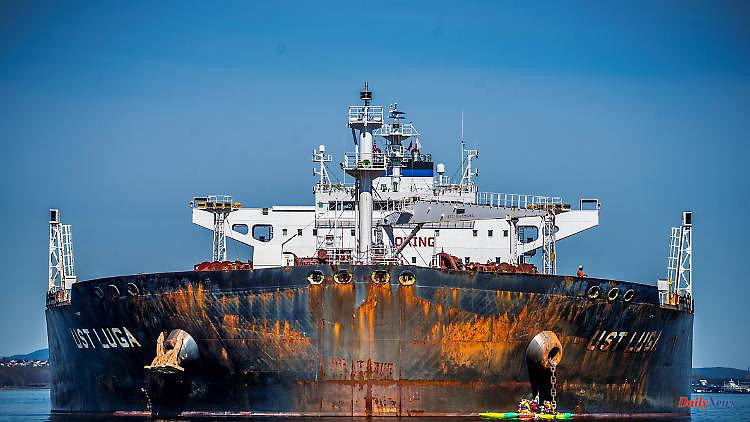The EU states have only been able to agree on a "partial embargo" for Russian oil. But that, too, could have profound consequences. For Russia as for Germany - especially East Germany.
Negotiations have been going on for weeks, and now the compromise is in place: Chancellor Olaf Scholz and the other EU heads of state and government agreed at the Brussels summit on an extensive oil boycott against Russia because of the Ukraine war. That's just an "oil embargo light," says energy expert Claudia Kemfert. Nevertheless, it will have far-reaching consequences, also for millions of people in Germany. Especially in the eastern federal states, many fear for jobs and fear queues at gas stations and higher prices. Many things are not easy to assess, even for experts.
The Brussels compromise: tanker oil no, pipeline oil yes.
Originally, the EU Commission had proposed ending imports of crude oil from Russia within six months. At Hungary's insistence, however, it was decided that only Russian oil deliveries by sea would be stopped for the time being. Transports by pipeline should initially continue to be possible. Transitional periods and details are missing from the summit decision. They are likely to be formulated by diplomats in the next few days. With the compromise, "Europe was able to prevent embarrassment," says Kemfert, a specialist at the German Institute for Economic Research (DIW). The "light" embargo will hit Russia hard.
German dependence on Russian oil has fallen
For Germany, the situation after this EU compromise is as follows: According to Economics Minister Robert Habeck, the share of Russian oil in German consumption has already fallen from 35 percent before the Ukraine war to 12 percent. Tanker oil - about a third of the amount before the war - had been replaced, Habeck said at the beginning of May. So the EU decision doesn't change anything. Before the war, however, two thirds of German oil imports from Russia came via the "Druschba" pipeline to the large East German refineries in Leuna and Schwedt.
Germany and Poland voluntarily renounce
In theory, Leuna and Schwedt could continue to be supplied via the "Druschba" after the EU decision, since the pipeline is exempt from the embargo for the time being. But Germany and Poland made a so-called protocol declaration at the EU summit: they confirmed in writing that they would stop buying Russian oil by the end of the year. In practice, the "pipeline exception" only applies to Hungary, Slovakia and the Czech Republic.
According to EU diplomats, the statement also served to facilitate the compromise. For some EU countries it would have been completely unacceptable if an economically strong country like Germany had continued to benefit from cheap Russian oil.
Criticism from East Germany
While the operator Totalenergies has already announced that it will not use Russian oil for the central German refinery in Leuna, the case for the PCK refinery in Schwedt with around 1,200 employees is different: it will continue to be supplied by the German subsidiary of the Russian state-owned company Rosneft with Russian oil operated by the "Druschba".
Habeck is looking for alternative delivery routes for Schwedt with tanker oil via Rostock and Gdansk. Nevertheless, the state of Brandenburg fears that the refinery would only be used to 60 percent capacity. The concern: The system could become uneconomical and jobs could be lost. And the supply of East German gas stations, industry and heating oil tanks could stutter.
Habeck has promised deliveries from the oil reserve in the West and financial aid, but the city of Schwedt and East German politicians are demanding more: "The East Germans must not be the victims of the embargo policy," says the left-wing faction's East German representative, Sören Pellmann. "If there are exceptions for EU countries, East Germany should also be able to make use of them."
Oil price is likely to rise
For all German consumers and industry, the "oil embargo light" should also have an impact on costs. Because Russian oil has to be replaced on the world market, demand drives up prices for oil from other sources. In fact, crude oil prices rose significantly the morning after the decision.
But even experts have a hard time making forecasts. "We'll have to wait and see how crude oil prices develop," says Düsseldorf economist Jens Südekum. The markets would have expected the EU compromise that has now been found. "I'm not assuming that there will be shock price jumps," says Südekum.
The head of the International Energy Agency (IEA), Fatih Birol, warns of a fuel shortage in Europe. "The oil markets could get tight next summer," he told Der Spiegel. When the main holiday season starts in Europe and the USA, the demand for fuel will increase. Then there could be bottlenecks. The European countries are "not only dependent on crude oil supplies from outside, but also on imports of oil products".
relief for drivers
According to Südekum, it is even more difficult to predict the prices at the pump. The expert said: “There is a market with many influencing factors when it comes to the price of petrol. But if my thesis on crude oil prices is correct, then there shouldn’t be any jumps in petrol prices, or they should have other causes Tank discounts dominate, so that the prices at the gas station are falling."
This tank discount is part of the federal government's relief package: From Wednesday to the end of August, the tax burden on fuel will drop by 35.2 cents per liter for premium petrol and by 16.7 cents per liter for diesel. Will this offset the possible effect of the oil embargo? Südekum is cautious: "In earlier similar decisions, we saw that only 60 percent of such tax cuts were passed on to consumers. Since both are now coming together - oil embargo and tank discount - it will probably only be possible to forensically understand how prices have developed in retrospect to have."












